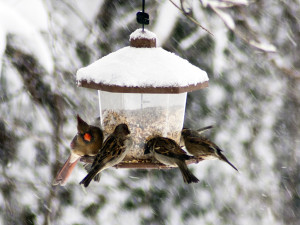By Don Torino
As we lose more and more natural places to development, our backyards become that much important to the survival of many birds and other wildlife, as our small and seemingly insignificant backyards now become stepping stones for migratory birds and an oasis for birds that will depend on your yard to make it through the harsh winter months. In winter countless migratory birds that travel here all the way from northern Canada will be calling your backyard home. There are some important things we can do to welcome them and help them survive our long New Jersey Winter.
* Garden Naturally! –
Many dried flower heads such as Purple Coneflower, Black-eyed Susan and Agastache, provide birds with seeds even into winter so don’t be so quick to cut them back. Also many shrubs such as Winterberry Holly and native viburnums will hold their fruit into the cold months and provide needed cover, so let the birds eat what is there and don’t worry about making your garden look manicured.
* Don’t Clean Up !
Another important tip to remember is to use leaves as mulch. Leaf litter will help provide seeds and insects that many birds such as Hermit Thrush, Fox Sparrows and Towhees depend on. In addition, your garden may also host many butterflies and moths during winter. When you prune or make your garden look neat and clean you may also be throwing away next year’s butterflies and beneficial insects. Introducing a more natural gardening approach will help our birds not only in winter but throughout the year.
* Provide water –
Birds need to drink all year round, but finding water in winter is especially tough for them when temperatures dip below freezing. Providing a thawed out source of water such as a heated birdbath may be the only source of drinkable water for miles around and can mean survival for many of our backyard friends. Even if you don’t have electric near your birdbath you can pour some warm water out in the morning that will provide water at least until it freezes over. Birds are not concerned if your birdbath cost hundreds of dollars or is just a garbage can lid. The important thing is that the water is out there for them to use when they need it.
*Fill your birdfeeders with a high energy good quality bird seed mix.
If you plan on feeding the birds use a good quality bird seed mix , it may cost more than a cheaper bag full of filler or junk seeds that birds don’t need or eat. A good quality seed mix is well worth it to our birds. Black oil sunflower, Safflower, Peanuts, and white Proso Millet should be part of your backyard bird banquet. Try to keep feeders full, especially throughout the bitterly cold months. Remember to keep your feeders clean and rake up any shells that might build up under your feeders.
*Provide Suet–
Suet is a high fat, high energy food that will help keep birds such as woodpeckers warm and healthy as the cold winds blow. When evening temperatures get really low most small birds can only eat enough to survive the night. Suet will provide the needed fat to help them generate enough heat to get through till morning. The same rules apply to suet as the birdseed, good quality suet with no fillers is well worth the money. Some winters I have had birds such as Ruby-Crowned Kinglets and Pine Warblers eating my suet so you never know what birds you might be helping to survive in your winter habitat.
*Keep your bird houses up!
Birds such as Chickadees, Nuthatches and Tufted Titmouse use tree cavities to not only nest in the spring but also to keep warm on cold winter nights. Since natural tree cavities are few and far between in suburbia it is a great idea to keep all your bird houses up throughout the winter. Also, putting up special roosting boxes, that will allow birds to keep warm and roost together work great. Installing nesting shelves or platforms for birds that don’t use a traditional bird house such as Cardinals and Mourning Doves will help many species through the bad weather of winter
*Create a brush pile.
One of the best and most inexpensive things you can do to help the birds in winter is to make a brush-pile. By making a mound of old branches you can create a place for birds to get away from predators, be protected from winter’s winds and provide a place to rest. Many of our winter backyard birds are ground feeders. Juncos ,White-throated, Fox and American Tree Sparrows depend on natural cover for protection. Since many of those places no longer exist in our suburban jungle brush piles can do a good job in replacing some of the natural cover that has disappeared. For more info on creating brush piles go to http://birding.about.com/od/attractingbirds/a/howtobrush.htm
*Work a Habitat plan for next year.
As the bitter cold sets in and we spend more time indoors it’s a good idea to start working on backyard habitat plans for next season. Research native plants that benefit the birds and decide where to put them in your yard come spring. Make plans for spring nest boxes and if you don’t already know how, learn to garden organically. Your birds, and your family, will thank you for it.
Our backyards are as much a part of the environment as any park, forest or nature preserve. Creating a special place for wildlife this season will help many birds survive the tough, long winter months and at the same time help us keep connected to the natural world around us.


Where’s the best place to purchase 40 lb. bags of bird seed such as sunflower kernels? Any suggestions?